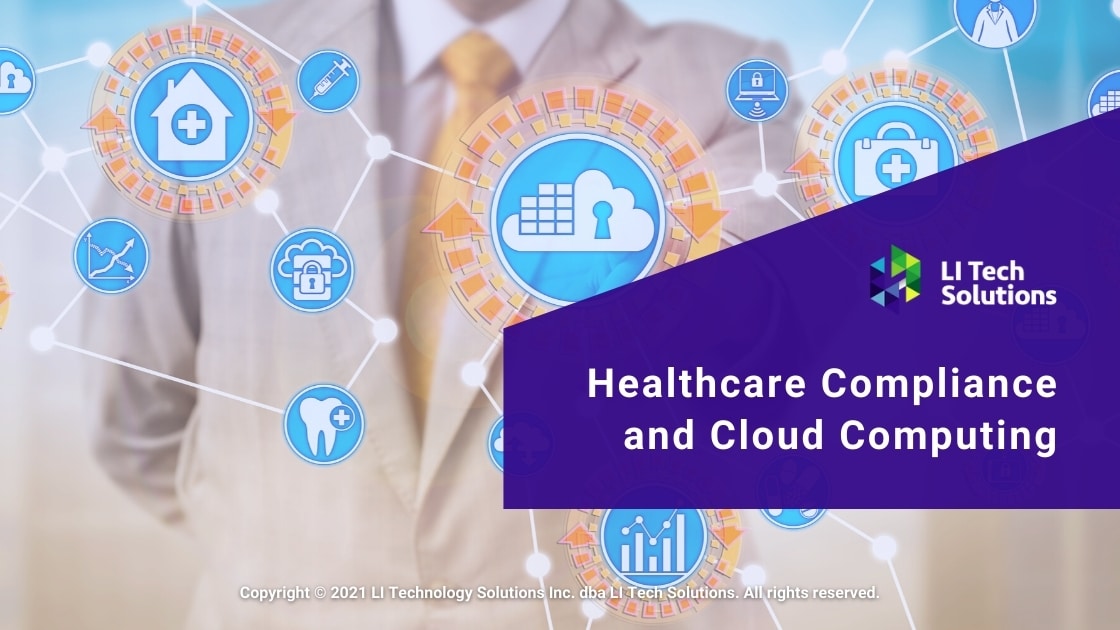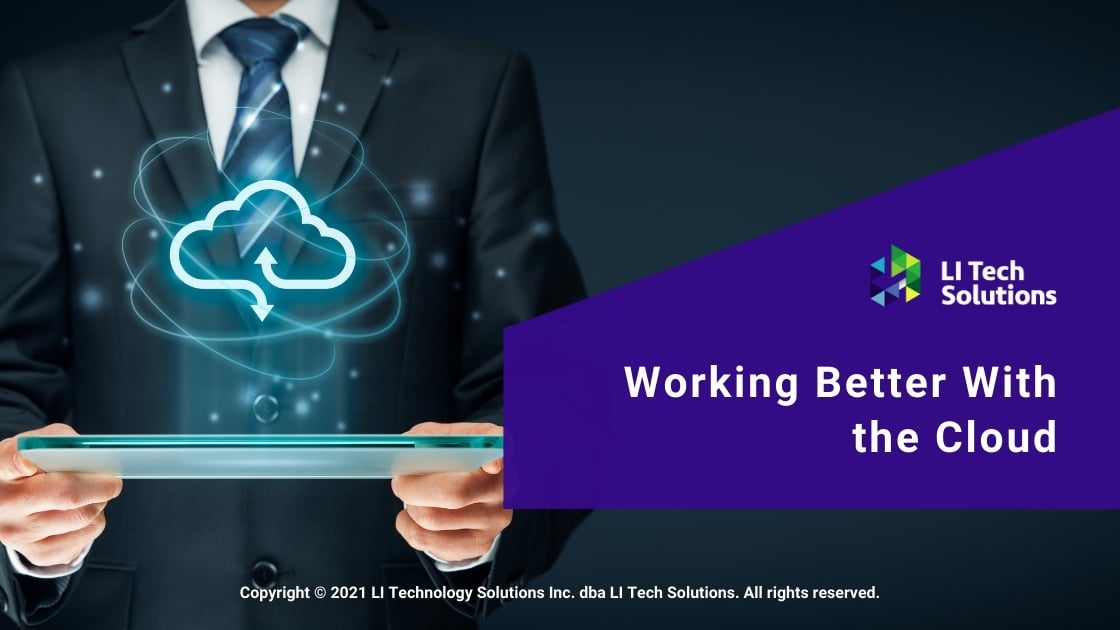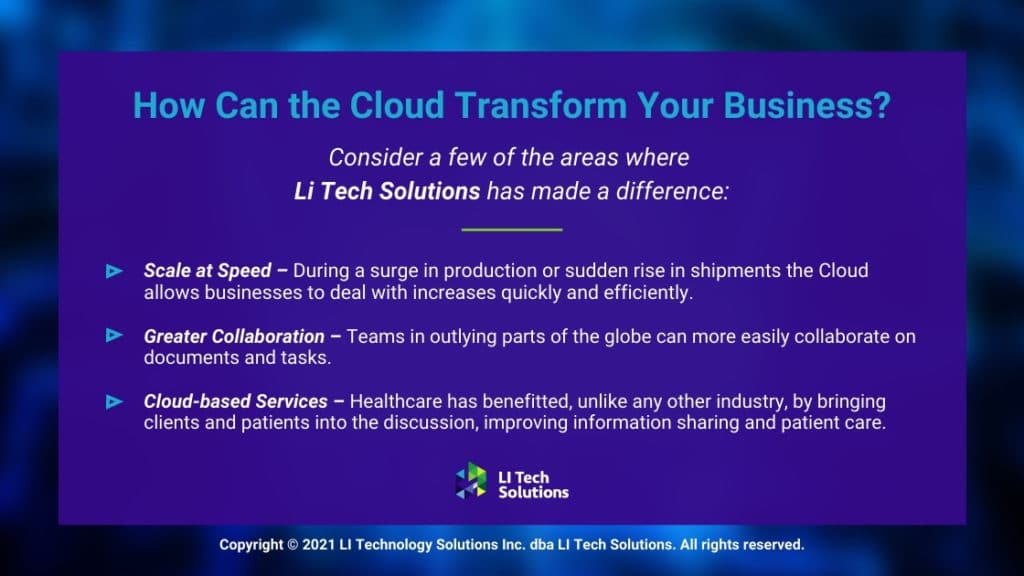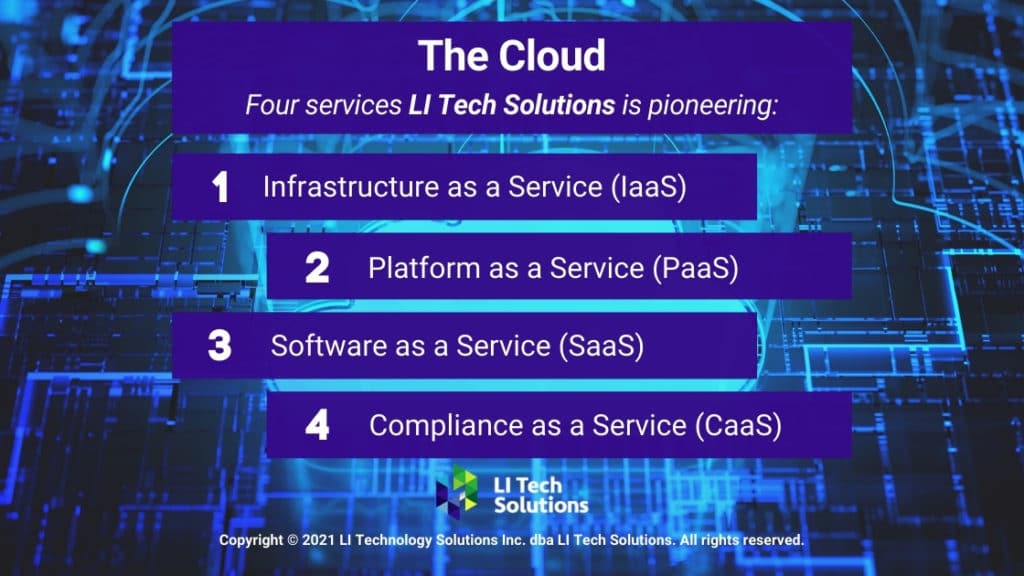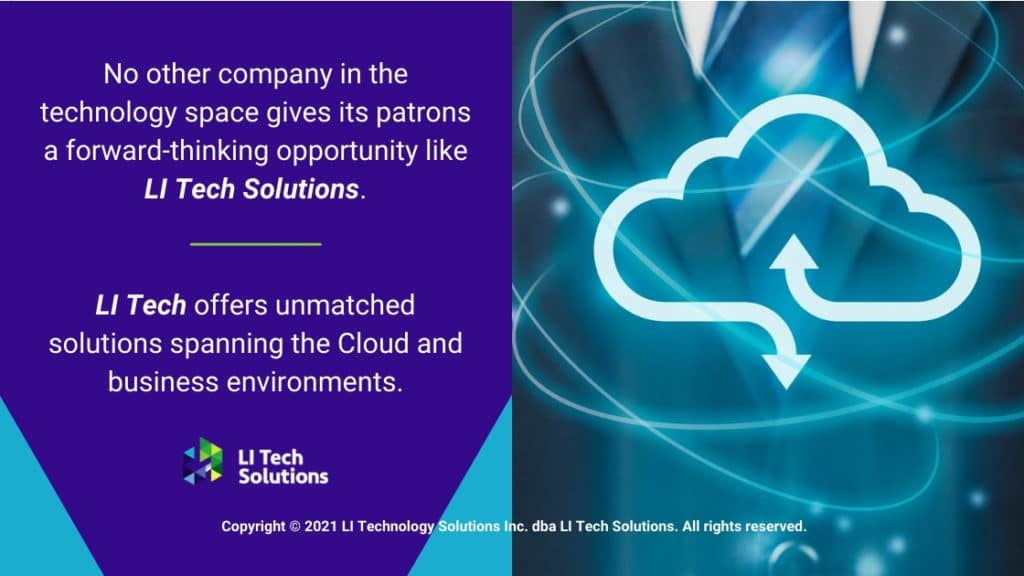Healthcare Compliance and Cloud Computing
Cloud computing is revolutionizing every facet of healthcare services. HIPAA- compliant storage, applications, and varied networks worldwide are trending to the cloud, solving complex infrastructure issues and data protection solutions.
Long Island Tech Solutions: What Is the Cloud?
The fundamental premise of the cloud is to provide a computing model to enable ubiquitous, convenient, on-demand network access. The cloud is a shared pool of configurable computing resources (servers, networks, storage, applications, and proprietary services) that can be rapidly provisioned with minimal management or provider interaction.
Cloud compliance within the healthcare space continues to be identified as a pivotal facet for protecting patient data. Cloud innovation continues to evolve, and lax protection cannot be permitted. There is no resolution in sight to skyrocketing ransomware and malicious code attacks.
The following post highlights a few of the challenges and innovations healthcare organizations face in a world of increasing cloud adoption and rampant cyber-raids.
- Attacks Are on the Rise
- HIPAA Compliance
- Compliance in the Cloud
- Innovate in a Multi-Cloud World
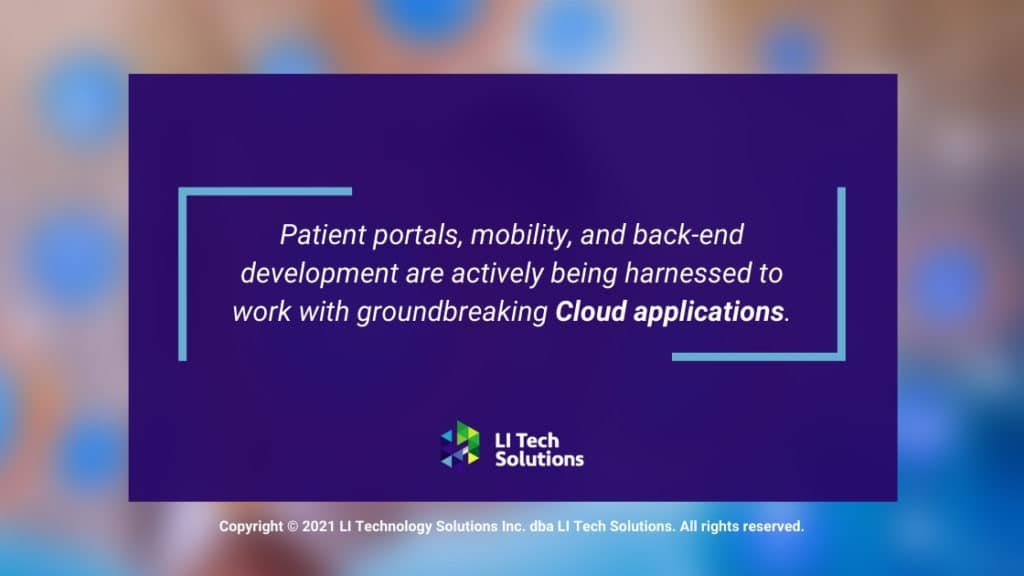
Varied healthcare industries ranked personalized care (52%) and AI assistants (44%) positively impacting cloud adoption. Patient portals, mobility, and back-end development are actively being harnessed to work with groundbreaking cloud applications.
LI Tech Solutions provides breakthrough Managed Services Support for Long Island and worldwide healthcare. LI Tech’s regulatory compliance division can equip your enterprise with proprietary hybrid cloud frameworks to mitigate any malware attack. (516) 210-6400
Healthcare cost restraints and data protection solutions rooted in the cloud are rapidly being implemented worldwide. Ransomware, service denials, and other malicious codes are proliferating more than ever before.
Streamlining Healthcare Data Management with Managed IT Services in Long Island
Attacks Are on the Rise
Millions of individuals are being affected by extortion-based ransomware attacks carried out against healthcare companies:
- 48,000 patients of CarePointe Enterprises, an Ear, Nose, and Throat specialist in Merrillville, Indiana, announced a ransomware attack on June 21, 2021
- Atlanta Allergy and Asthma reported an assault on 9,851 of its patients in January of 2021.
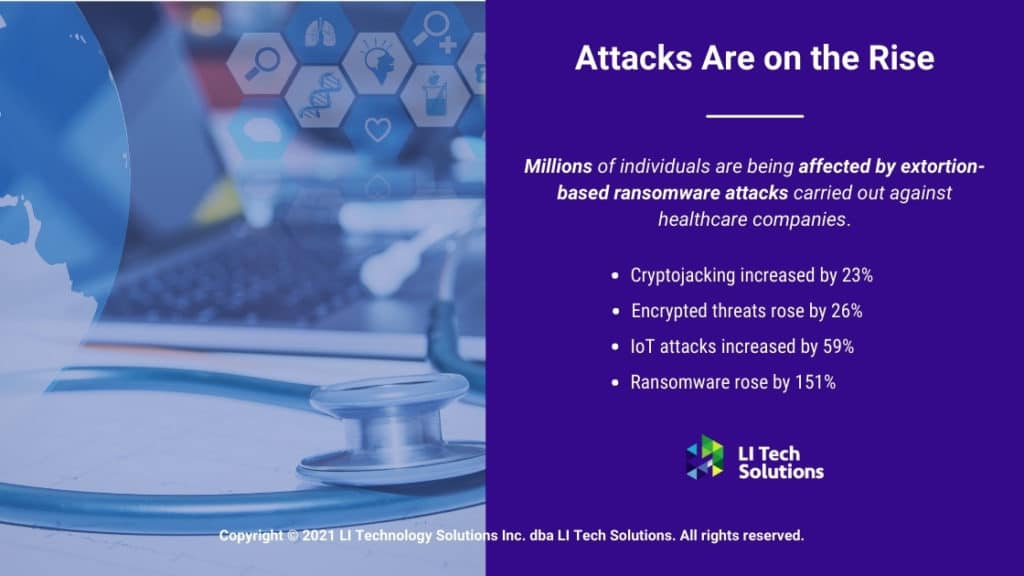
Attacks against healthcare continue to escalate. SonicWall gave its mid-year threat assessment. In just the first six months of 2021:
- Cryptojacking increased by 23%
- Encrypted threats rose by 26%
- IoT attacks increased by 59%
- Ransomware rose by 151%
HIPAA Compliance
Healthcare organizations worldwide are under intensifying pressure to satisfy the mounting demands of patients and administrative compliance. Data security is a motivating factor for cloud deployment decisions by a majority of healthcare firms. Cost concerns placed a distant third.
Healthcare, across every industry vertical, must use care when implementing cloud-based solutions. The HIPAA Privacy Rule vigorously protects an individual’s information when dealing with any electronic activity.
HIPAA compliance requires healthcare systems to have appropriate physical, administrative, and technical safeguards protecting PHI and ePHI files.
Read more in our article: Healthcare’s Digital Transformation: Why It Matters
New York City’s Best MSP: LI Tech Solutions (516) 210-6400
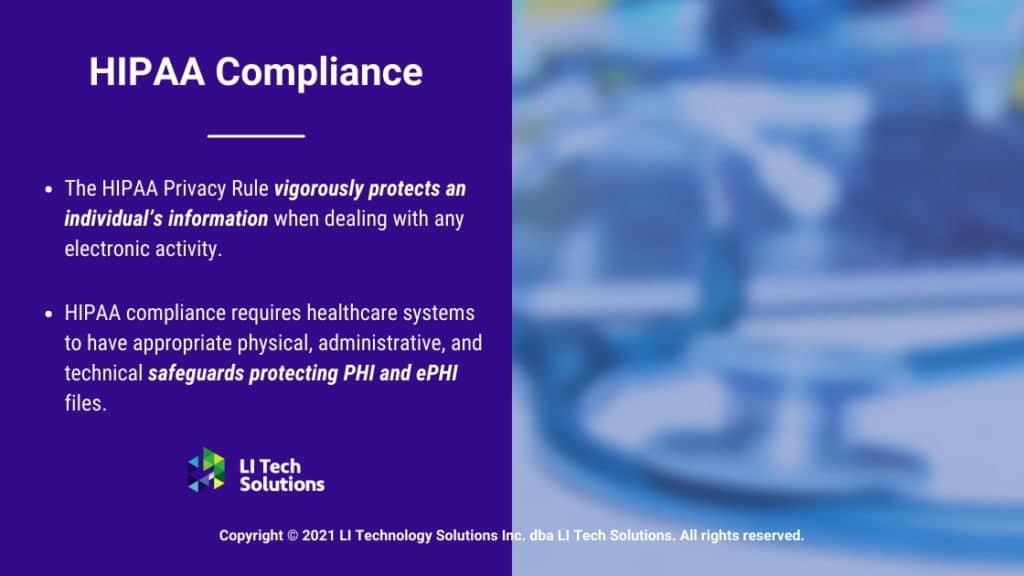
A substantial impediment to adopting cloud services is the treatment by HIPAA of external cloud partners. Healthcare Cloud vendors or subcontractors are compelled to secure an individual’s PHI to HIPAA standards. This element alone is intimidating to many smaller, under-resourced companies on the Cloud’s periphery.
The HIPAA Omnibus Rule is another fundamental safeguard of patient histories. Healthcare companies and their business associates/subcontractors must enter into a transaction agreement delineating the proposed uses of a patient’s personal healthcare information (PHI). If an associate runs afoul of the HIPAA law, the originating healthcare company can be held directly liable for the breach.
Technology functions differently in the healthcare space because of how electronic data is processed and stored.
Compliance in the Cloud: LI Tech Solutions Shows You How
HIPAA compliance in a world of accelerating advancements in cloud computing is a daunting task for every healthcare entity.
In 2014, NIST set a Cybersecurity framework for industries to establish cloud compliance within the HIPAA Rules and Regulations. Loopholes, uncovered by enterprising cyber-attackers, must be sealed with the help of determined American IT companies.
Framework Foundation:
- Identify personnel, devices, systems, and facilities and define their importance to the organization and business objectives. Prioritize the organization’s cloud mission and its objectives. Define cybersecurity roles, responsibilities, and corresponding risk-management arrangements.
- Monitor regulatory risk and operational governance.
- Establish risk tolerances and cloud priorities.
- Ensure personnel is adequately trained to maintain cloud security obligations.
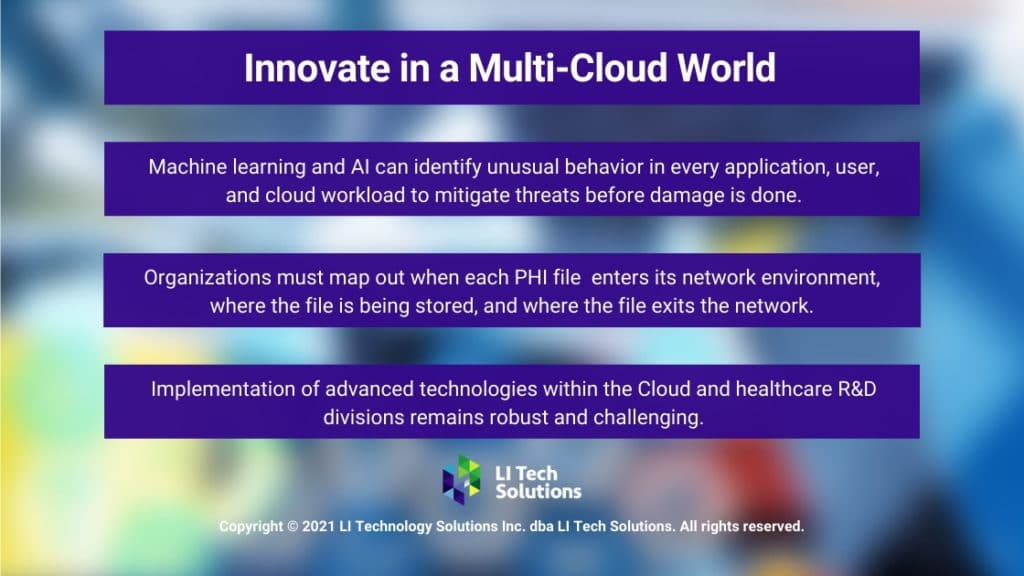
Innovate in a Multi-Cloud World
Healthcare is no longer a quaint little doctor sitting in a book-filled room, just down the street. Physician groups around the globe draw on the competence of countless other professionals connected to the unparalleled cloud foundation.
Regulatory frameworks, HIPAA, GDPR, and HITRUST, among other agencies, afford protection for various patient-critical environments. Healthcare continues its universal adoption of the cloud and its sophisticated technologies.
Multi-Cloud offerings and hybrid technologies offered by elite IT service companies, LI Tech Solutions, and others, innovate and leverage data in real-time.
LI Tech Solutions is an elite managed services provider for the healthcare sector in Long Island. (516) 210-6400
Managed IT services for nonprofits are an emerging area of technology. LI Tech Solutions and other elite IT firms, offer powerful implementation and consulting of deep-dive cloud frameworks.
Machine learning and AI have become embedded in every facet of healthcare, providing powerful insights and network security. Unusual behavior can be identified in every application, user, and cloud workload to mitigate threats before damage is done.
Data encryption has developed into a strategic ingredient in a layered approach to patient care. Organizations must map out when each PHI file enters its network environment, where the file is being stored, and where the file exits the network.
HIPAA requires each healthcare company to encrypt and decrypt electronic health information for each of its patients. (ePHI)
HIPAA does not stipulate what degree of encryption is required for PHI files. However, best practice across the industry recommends AES-128, AES-256 or better.
Key segments of the healthcare sector continue to identify shifting models made up of multi-cloud structures and HIPAA compliance.
Implementation of advanced technologies within the cloud and healthcare R&D divisions remains robust and challenging.

